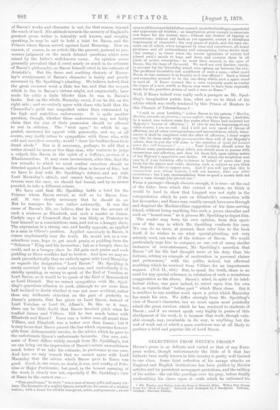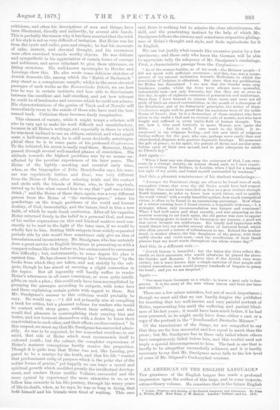SELECTIONS PROM HEINE'S PROSE.*
HE1NB'S prose is as delicate and varied as that of any Euro- pean writer, though unfortunately the little of it that has hitherto been really known in this country is pretty well limited to one class. Some faint reflection of his savage attacks on England and English institutions has been yielded by Review articles and by persistent newspaper quotations, and.the raillery of his asides—the cat-like purrings over his prey, before finally unsheathing his claws upon it—with which he enlivened his * me, fYisdorn, and Pathos, from the Prnse of Ileforfeh Mine. With a Few Pieces from the "Book of Hamm" Selected and Arranged by J. Snodgrass. Trltbner, London ; Gardner, Paisley. criticisms, and often his descriptions of men and things, have been illustrated, directly and indirectly, by several able hands. This is probably the reason why it has been asserted that the trick of his style is not 8D very difficult of imitation. But Heine was far from the cynic and railer, pure and simple; he had his moments of calm, earnest, and elevated thought, and his reverences were often exercised towards worthy objects. He was delicate and sympathetic in his appreciation of certain forms of courage and nobleness, and never reluctant to give them utterance, on fitting occasions. His well-known apostrophe to Herder and Lessings show this. He also wrote some delicious sketches of Jewish domestic life, among which the " Rabbi of Bacharach " may stand as a conspicuous sample; whilst in the more elevated passages of such works as the Bortiantische Schule, we see how true he was in certain instincts, and how able to discriminate between the excellent and half-excellent, and yet how tolerant he could be of tendencies and excesses which he could not admire. His characterisations of the genius of Tieck and of Novalis will immediately recur to the minds of those who have read the last- named book. Criticism there becomes finely imaginative.
This element of variety, while it might tempt a selector, will also be very apt to make his work difficult and unsatisfactory, because in all Heine's writings, and especially in those in which he was most inclined to use au oblique, satirical, and what might seem a half-sincere style, he is still more decidedly autobiogra- phical than he is in some parts of his professed CoefiRsions. To the initiated, his secret is easily read there. Moreover, Heine passed through several well-marked phases of conviction. His
attitude towards the highest problems was by no means un-
affected by the peculiar experiences of his later years. The Heine of the lightly - mocking and scornful early time, when, as the biographer of Felix Mendelssohn says, his man- ner was repulsively listless and blase, was very different from the Heine of Paris, after sobering trials and the contact and strife with the friends of Borne, who, in their reprisals, served up to him what caused him to say that " gall was a bitter drink ;" and the Heine of these days, again, was a very different person from the Heine of "the mattress-grave," where his ponderings on the tragic problems of the world and human destiny, of God, immortality., and the future, bred in him a new faith, of which he made frank confession. After all his vagaries, Heine returned firmly to the belief in a personal God, and some of his earlier expressions on this and kindred matters need con- stantly to be read in the light of the later ones, if we would be wholly fair to him. Setting little snippets from widely-separated periods side by side would thus sometimes only give an idea of irresolution and inconsistency. Mr. Snodgrass, who has certainly done a great service to English literature in presenting us with a compact volume like that before us, has endeavoured to surmount this difficulty ; but, unfortunately, to some degree his plan is against him. He has chosen to arrange his " Selections " by the books from which they are taken, and not strictly by the sub- jects, though he has aimed at securing a slight connection in the topics. But all ingenuity will hardly suffice to render Heine's utterances in all cases consistent, or even quite intelli- gible, on such a plan ; this could only have been accomplished by grouping the passages according to subjects, with notes here and there explaining certain points with regard to them. But Mr. Snodgrass's answer to this criticism would probably be easy. Ho would say :—" I did not primarily aim at compiling a book for critics, but a pleasant volume for readers who would be content with stray gems, without their setting, and who would find pleasure in contemplating their varying tint and lustre, and not torment themselves with a desire to know their exact relation to each other, and their effects on close contrast." In this respect, we must say that Mr. Snodgrass has succeeded admir- ably. As was to be expected, he has somewhat overdone, to our mind, that side of Heine which most recommends itself to cultured youth ; but the calmer, the completer expressions of Heine's maturer conceptions hardly receive due proportion. Though it is quite true that Heine was not, like Leasing, pre- pared to be a martyr for the truth, and that his life "wanted that predominant unity of purpose which is the polar star of the nobler forms of genius," yet happily we can trace a moral and spiritual growth which modified greatly the intellectual develop- ment, and renders Heine (unlike Voltaire, successful and the more cynical by experience) the more attractive to us, as we follow him onwards in his life-journey, through his weary years of life-in-death, when, as he says, he was so long in dying, that both himself and his friends were tired of waiting. This once
" As of the master-builder, so of his work—the Hebrew people—I did not speak with sufficient reverence ; and this, too, was a conse- quence of my natural inclination towards Hellenism, to which the asceticism of Judaism is abhorrent. But since then my predilection for Hellas has diminished. I see now that the Greeks were only handsome youths, whilst the Jaws were always men—powerful, iudomitablo mon—not only formerly, but that they are so even to this day, in spite of eighteen centuries of persecution and misfortune. Since then I have learned to esteem them more, and were not all pride of birth an absurd contradiction, in the mouth of a champion of the Revolution, and of its democratic principles, the writer of these Confessions might well be proud that his ancestors were of the noble House of Israel ; that he is a descendant of those martyrs who have given to the world a God and an eternal code of morals, and who have fought and suffered in every battle-field of human thought. You see, how I, who used formerly to quote Homer, now quote the Bible And in truth, I owe mach to the Bible. It re- awakened in mo religious feeling ; and this new birth of religious feeling suffices for the poet, who can, perhaps more easily than any other mortal, dispense with positive dogmatic theology. He possesses the gift of grace ; to his spirit, the portals of divine and secular sym- bolism open of their own accord, and to gain admission ho needs no Church key."
And again :-
" When I hear any one disputing the existence of God, I am over- come by a strange anxiety, an uneasy dread, such as I once experi- enced in visiting New Bedlam, in London, when I had for a moment lost sight of my guide, and found myself surrounded by madmen."
And this, a pleasant reminiscence of his student wanderings :—
" Amongst the Protestant clergy are often to he found men of such exemplary virtue, that even the old Stoics would have had respect for them. One must have travelled on foot as a poor student through North Germany, in order to know how much virtue, and to qualify the word 'virtue' with a really beautiful epithet, how much evangelical virtue, is often to be found in an unassuming parsonage. How often of a winter evening have I found therein a hospitable welcome,—I, a stranger, whose only recommendation was hunger and weariness t When I had well eaten and slept soundly, and was preparing on the morrow morning to set forth again, the old pastor was sure to appear in his dressing-gown to bestow his blessing on my journey, a good act that never brought me misfortune. His kindly and loquacious wife would thrust into my pocket several slices of battered broad, which also often proved a source of refreshment to mo. Behind the mother stood, in modest silence, the fair daughters of the pastor, with their. ruddy cheeks and violet oyes,—and the recollection of their timid glances kept my heart warm throughout the whole winter day."
And this, in a different vein :—
" Jewish history is beautiful ; but the latter-day Jews reflect dis- credit on their ancestors, who would otherwise be placed far above the Greeks and Romans. I believe that if the Jewish race wore extinct, but it were known that a single survivor of that people still existed somewhere, men would journey hundreds of leagues to grasp his hand ; and yet we are despised."
Again :- " One must know Germany as a whole ; to know a part only is dan- gerous. It is the story of the tree whose leaves and fruit are bane and antidote."
There are a few minor mistakes, but not of much importance ; though we must add that we can hardly forgive the publisher for inserting that too well-known and very painful portrait of Heine, representing him amid the suffering and partial blind- ness of his last years ; it would have been much better, if he had even procured, as he might easily have done, either a cast or a copy of the portrait in the " Zweihundert Deutsche Manner."
Of the translations of the Songs, we are compelled to say that they are far less successful and less equal in merit than the prose ; but Mr. Snodgrass has in these only failed where others have conspicuously failed before him, and this verdict need not imply a special discouragement to him. The task is one that is hardly to be altogether successfully achieved, and it is hardly necessary to say that Mr. Snodgrass never falls to the low level of some of Mr. Stigand's Cocknoyfied versions.
said, there is nothing but to admire the close attentiveness, the skill, and the penetrating instinct by the help of which Mr. Snodgrass follows the sinuous and sometimes serpentine gliding- ness of Heine's thought and style, and finds equivalents for it in English.
We can but justify what sounds like excessive praise by a few specimens ; and those only who know the German will be able to appreciate fully the adequacy of Mr. Snodgrass's renderings. First, a characteristic passage from the Confessions:—



































 Previous page
Previous page